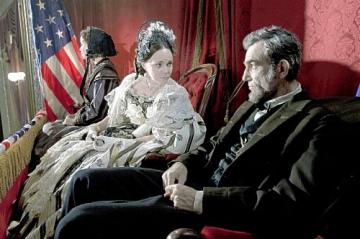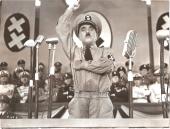Tuesday, July 30, 2024 - 3:03am
Lincoln film humanizes the legendary president
Fourscore and 17 years ago, our forefilmers brought forth upon this continent "The Birth of a Nation," conceived in racist liberties and dedicated to the proposition that all Abe Lincoln movies could play equally fast and loose with American history.
Now, Steven Spielberg is engaging us in a great Civil War film testing whether his and Tony Kushner's version of the Emancipator can endure the scrutiny of fact-checkers and whether audiences can endure 2 1/2-plus talky hours of what is essentially a courtroom drama about a piece of legislation.
There can be some quibbling but no commercial doubt about the result: No director is more "of, by and for" the people than Mr. Spielberg, in general. But the primary credit for "Lincoln's" impact goes to Daniel Day-Lewis in the title role and Tommy Lee Jones as his problematic ally, Thaddeus Stevens. You'll look hard and wait long to find another set of such beautifully calibrated performances from them and their distinguished chamber ensemble.
The material doesn't get more dramatic. January 1865: In the waning but still horribly bloody days of the war, Lincoln and his bickersome Cabinet are wrestling with how to end it -- and slavery. The complexities are enormous. The Union's recent military successes have brought about a secret Confederate peace mission, to press for a negotiated peace. Hardliners want an unconditional surrender. The country, including Lincoln, desperately wants peace. But he wants the 13th Amendment even more. And he wants it now, before and not after the peace.
No new constitutional amendment had been adopted since 1804. The 13th, outlawing slavery, had been passed by the Senate in 1864 but still languished in the House. Why the big hurry? Wasn't the Emancipation Proclamation enough?
No, it was not. The 1863 proclamation declared freedom for slaves in the 10 Confederate states, not in the border states; nor did it make slavery illegal in itself. Lincoln and other abolitionists were concerned that, once the war ended, it could be construed as a temporary measure solely based on presidential war powers.
Lincoln was nothing if not a lawyer -- a damn good one -- who saw that permanently ending slavery was as big a legal as a military problem: to repair the fatally flawed Constitution at its hypocritical core. His terribly ironic dilemma: Peace was the last thing he needed right now, before the amendment was passed, and could preclude its chances of passage.
Based, in part, from Doris Kearns Goodwin's "Team of Rivals," Mr. Kushner's screenplay reminds us of what a divided and unmanageable thing this new Republican Party was -- a ragtag assembly of old Whigs, Union Democrats, radical abolitionists, et al. fractious factions, just half a dozen years old. The rivals in Lincoln's Cabinet team included his defeated competitors for the 1860 presidential nomination, chief among them William Seward (David Strathairn), the secretary of state, and Edwin Stanton (Bruce McGill), the short-tempered secretary of war.
But the show is stolen by Pennsylvania's own Rep. Thaddeus Stevens (Tommy Lee Jones), acid-tongued leader of the "Bloody Shirt" radicals, on whom Lincoln most depended for passage of the amendment in the House of Representatives. Stevens was a defender of Native Americans, Mormons, Jews, Chinese and women, as well as fugitive slaves. An Underground Railroad site was discovered beneath his office in Lancaster, and he was devoted to full emancipation as a tool to weaken the rebellion: "Slavery gives the South a great advantage," he said. "They need not, and do not, withdraw a single hand from the cultivation of the soil. Every able-bodied white man can be spared for the army ... If the slaves no longer raised cotton and rice for the rebels, the war would cease in six months."
Mr. Jones -- a shoo-in for next year's best supporting actor Oscar -- brilliantly plays this great firebrand, who founded one of the first publicly funded schools for black children (and has three schools bearing his name in the Pittsburgh area alone). The film also quietly celebrates his mixed-race housekeeper Lydia Hamilton Smith (S. Epatha Merkerson), likewise involved with the Railroad -- and Stevens -- for 20 years. He would help the wily, melancholy Lincoln thread the needle of morality and political reality.
Which brings us to the male Meryl -- Mr. Day-Lewis ("My Left Foot," "Gangs of New York," "There Will Be Blood"), who looks like he just stepped off the $5 bill but whose Lincoln is, in fact, carefully crafted from the inside out: a shrewd, playful power broker of many paradoxes, homely in all ways, who liked to speak in parables. ("No matter how much cats fight, there always seem to be plenty of kittens.") Previous film incarnations (Henry Fonda's "Young Mr. Lincoln," Raymond Massey's "Abe Lincoln in Illinois") gave him a deep, stentorian voice. Mr. Day-Lewis has opted for the high, reedy tenor that contemporaries attributed to him. The result is pitch perfect.
Sally Field's Mary Todd Lincoln is no less powerful. Still devastated and guilt-ridden by the typhoid death of their son Willie in 1862, she worries her husband constantly with her "inexhaustible grief" -- not to mention her migraines, delusive mood swings, fierce temper and public outbursts that, in a later day, would be diagnosed as bipolar disorder. Her fear of the madhouse was eventually realized when son Robert had her committed to an asylum in Batavia, Ill., in 1875.
Here, Joseph Gordon-Levitt ("The Dark Knight Rises") plays feckless Robert as caught in his parents' domestic quarrel over whether he should be allowed to enlist in the war effort. (Beloved of his mother, just tolerated by his father, Robert was an unlucky figure: He arrived at Ford's Theater just after Lincoln was shot. As President James Garfield's secretary of war, he was at the train station in Washington where Garfield was shot in 1881 and at the Pan-American Exposition in Buffalo when President William McKinley was shot in 1901. He declined subsequent White House invitations with, "There is a certain fatality about presidential functions when I am present.")
By contrast, the film's tender scenes with Lincoln's high-spirited son Tad (nicely played by the nicely named Gulliver McGrath) are delightful. The boy permissively ran amok in the White House, interrupting meetings and charging people to see his dad.
Mr. Spielberg wanted to avoid cynicism and hero worship, we are told, and there are few battle scenes -- perhaps too few for the masses? This legal drama often plays like "1776" without the music. Speaking of music, John Williams might consider sending half of his paycheck to the Aaron Copland estate, but at least his relatively quiet score eschews his trademark bombast and largely lets us emote for ourselves.
Lincoln's Executive Mansion office is re-created precisely down to the wallpaper. The ticking of a watch we hear is the sound of the real Lincoln's watch. Was Tad really at a different play on April 14, 1865? Yes -- at Grover's Theater watching "Aladdin and the Wonderful Lamp," while his parents attended "Our American Cousin" at Ford's.
With charity, not malice, toward all, Lincoln pardoned deserters and wanted to let Jefferson Davis escape. Mr. Spielberg has done right by him. "Lincoln" is good history and a grand film. As we watch him ambling out of the White House for the last time, to the theater, we so want him not to go -- to be somehow detained or detoured. But he never is. He belongs not just to the ages, but to our finest moment of history and tragedy.
Seward said it in six words: "He is the best of us."
Vote:






